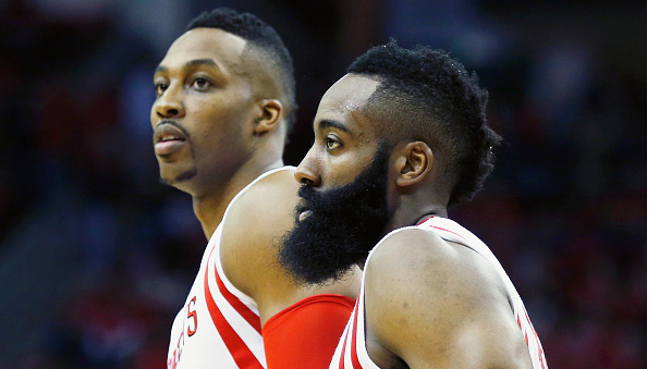
It’s no secret that the primary source of organizational dysfunction in Houston last season was the disconnect between the team’s superstar duo, James Harden and Dwight Howard. Just a year prior, the Rockets won 56 games and made a run all the way to the Western Conference Finals, with Harden finishing a close second behind Steph Curry in the MVP voting. (He would actually go on to beat Curry for that distinction at the first annual Players’ Choice Awards later that summer).
But the team took a giant step back in 2016, finishing with a middling 41-41 record, just good enough for an eighth seed in the Western Conference standings, which culminated in a disappointing first-round exit. Harden, likewise, went from perennial MVP candidate to not even making an All-NBA team.
It also became painfully obvious that Howard’s role in the Rockets’ schemes had been significantly reduced along the way. At one point toward the end of the season, the raw numbers showed that Howard had been relegated to a fifth option on offense, trailing behind players like Trevor Ariza, Michael Beasley, and Patrick Beverley in terms of field goal attempts per game.
Now, it’s come to light that it was no accident, but rather at the bequest of Harden himself, according to a recent report from Tim MacMahon of ESPN.com:
Former Rockets interim coach J.B. Bickerstaff resisted complying with the wishes of general manager Daryl Morey and owner Leslie Alexander regarding a drastic reduction in Howard’s playing time. Team sources said Alexander never participated in the meetings with Morey and Bickerstaff but fully supported the general manager’s plan to prioritize [Clint] Capela’s development.
League sources said input from face-of-the-franchise James Harden heavily influenced Houston management’s desire to decrease Howard’s minutes. However, team sources insisted that Harden was not involved in those discussions.
After Howard caught wind of this, he tried to work together with management to find a new landing spot before the trade deadline, but to no avail. Despite various trade rumors, the Rockets’ asking price was simply too high for potential suitors, ultimately forcing Howard to shamble along through the second half of the season before losing him for nothing in free agency.
The situation only served to exacerbate Howard’s growing reputation as a locker-room cancer and general malcontent, but information like this could help re-frame him as perhaps a victim of unfair circumstances as he continues to try and rehabilitate his image with his hometown Hawks.
(ESPN.com)






